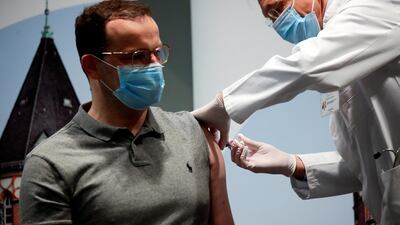Record daily Covid-19 cases were announced by 13 European countries on Wednesday, as governments around the continent enact tighter restrictions amid fears that hospitals could run out of intensive care beds with winter looming.
German health minister Jens Spahn tested positive just hours after attending a cabinet meeting. He is suffering cold symptoms and is now self-isolating.
Meanwhile Italy, the first European epicentre of the virus, announced a record 15,199 new cases.
Britain, which has implemented a series of local lockdowns, recorded a new high of 26,688 new cases. It came amid a row between the government in London and northern England's largest city of Manchester.
Authorities in the latter had demanded a financial package to support low-paid workers in exchange for going into a stricter lockdown. After they failed to agree a deal that met the demands of leaders in Greater Manchester, the government ordered the new restrictions anyway.
High infection rates were particularly prevalent in eastern Europe, with Bulgaria, Croatia, the Czech Republic, Lithuania, Poland, Romania, Slovakia, Slovenia and Ukraine recording record surges. So too did the Netherlands with 8,764 new cases in the last 24 hours and Switzerland with 5,583.
Earlier in the year, Switzerland was one of the least-affected countries but it is now seeing cases and hospitalisations doubling.
While new measures were introduced at the weekend, Swiss health minister Alain Berset said even tighter restrictions might have to be considered.
“The situation is worsening, and worsening fast,” Mr Berset told a press conference.
“Three weeks ago, we had a situation that was among the best on the European continent,” he said. “Three weeks later, we have one of the worst situations as far as Europe goes.”
The record cases in the Netherlands were announced as King Willem-Alexander apologised for taking a holiday to Greece last week despite the government introducing a partial lockdown.
In the Czech Republic, many stores and hotels have been closed after Prime Minister Andrej Babis warned the country’s health system could collapse as early as November 7.
People will be banned from leaving their homes, with some exceptions. They will still be allowed to travel to work, visit relatives, buy food and other necessities, do sports and travel abroad. State offices will also limit their opening hours.
“Those measures are in our view inevitable,” health minister Roman Prymula said. “To limit free movement of people is the most effective form of prevention,” he said. “All the measures limit contacts among people.”
Belgium, one of Europe’s worst-hit countries, has restricted nursing home visits. In the region of Flanders, infections in care homes have risen by 51 per cent and deaths have doubled in the last week.
The exponential infection growth rate across Belgium has created day-long queues at testing centres, leading the government to stop testing people who do not show Covid-19 symptoms.
Spain looks set to become the first European country to top one million cases with particularly tight restrictions now in place in the capital Madrid and the region of Catalonia.




















